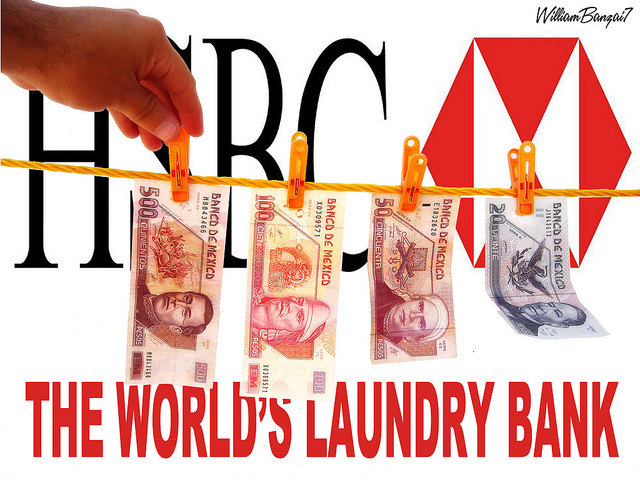Before:
– HSBC Joins JPMorgan: Prepares To Unveil Up To 20,000 Job Cuts
Now …
– HSBC to cut 25,000 jobs, slash billions from costs (CNBC, June 9, 2015):
HSBC will cut costs by as much as $5 billion within two years, laying off as many as 25,000 staff, the banking behemoth told investors Tuesday in a much-anticipated update.
The bank said that it would shrink its risk-weighted assets by about $290 billion, including cutting its global banking and markets risk-weighted assets to less than a third of the group’s assets.
Europe’s largest bank by assets also revealed plans to streamline its 260,000 strong workforce and trim its branch numbers by around 12 percent. The bank said it intended to sell its Turkish and Brazilian operations—although it will maintain a presence in Brazil to serve large clients—in what the it called a “significant reshaping of its business portfolio”.
Job cuts
The closures in Brazil and Turkey will result in a further 25,000 job cuts in addition to the other job losses announced Tuesday, the bank revealed in a statement to the Hong Kong Stock Exchange. Since its cost-cutting purge began in 2011, HSBC has cut about 40,000 people from its workforce.
“Brazil and Turkey have limited value to the franchise and that is why we have made the announcements we have today. These announcements prove there are no ‘sacred cows’ in the business,” HSBC chief executive Stuart Gulliver told investors on a conference call following its statement.
In the U.K., Stuart Gulliver said the bank would likely cut 7,000-8,000 roles, which would occur as a result natural attrition, or employees leaving on their own accord.
Chief Operating Officer Andy Maguire added that the bank’s push towards improved digital systems for consumers, and automation in branches, would result in thousands of job cuts.
Trade union Unite said the proposed job cuts in the U.K. were the latest example of a workforce being punished for misconduct by senior investment bankers.
“This latest wave of job losses is a stab in the back to a dedicated workforce who have put HSBC back on the road to recovery since 2008,” Unite national officer for finance, Dominic Hook, said.
“Unite are seeking to meet with U.K. Chief Executive Antonio Simoes as soon as possible to demand that any redundancies are through voluntary means or managed through natural attrition,” he added.
Relocating to Hong Kong?
Gulliver said that if the bank were to relocate its headquarters, as touted earlier this year, this would only result in around 250 job losses, meaning it would not be a “major employment issue”.
“We will make the decision towards the end of this year. If it was to leave the U.K. it would take another two years,” he said, stressing that no decisions had been made yet and that the issue had not even been discussed by the board.
The bank threatened to relocate its headquarters from London to Hong Kong earlier this year.
Being based in the U.K., HSBC is forced to pay a bank levy that cost the lender £700 million last year ($1.07 billion). Gulliver has openly criticized the levy, introduced by U.K. chancellor George Osborne in 2010, as well as the requirement to create a ring-fenced U.K. high street arm. He cited the measures as the key issues over headquartering in London.
Gulliver said that the ring-fenced bank would operate under a new brand name, yet to be determined, and would be headquartered in Birmingham.
‘Pivoting towards Asia’
Irrespective, the bank plans to accelerate its investments in Asia, singling out the Pearl River Delta in Guangdong province, China, and the ASEAN region as particular hotspots. It said it would expand its asset management and insurance businesses in Asia “with the aim of capturing expected opportunities from emerging wealth in the region”.
HSBC will now target a return on equity of more than 10 percent by 2017, down from a previous target of 12 percent to 15 percent by 2016.
Gulliver emphasized that the bank planned to continue to “pivot to Asia,” as the contribution from the region to the lender’s profits grew.
He said that some 650 million people currently resided in the ASEAN region—the same number of people as in the European Union—and that the very young demographic and emerging middle class made the further push into the region very attractive for future revenues.
Gulliver added that the the firm was about to enter another “prolonged period” of dividend growth.
However, markets were unmoved by Gulliver’s words, with shares in HSBC falling by as much as 1.3 percent to trade at 612 pence ($9.36) in London.
UK rebrand
Chirantan Barua, senior analyst at Bernstein, gave the stock a target price of 650 pence ($9.95).
“HSBC has failed to bring out anything radically different from moves, which have been widely expected for some months now. Given valuation and the Street’s expectations of earnings momentum, we would at this stage prefer to hold on to the stock but wouldn’t expect it to outperform,” the analyst said.
This is Gulliver’s second attempt in just four years at seriously reforming the bank. In the past year HSBC has weathered allegations that its Swiss private bank helped of wealthy clients to evade tax. The 150-year-old financial institution is also is midway through a deferred prosecution agreement with the U.S. over accusations it helped launder money for drug cartels and clients from Iran.

